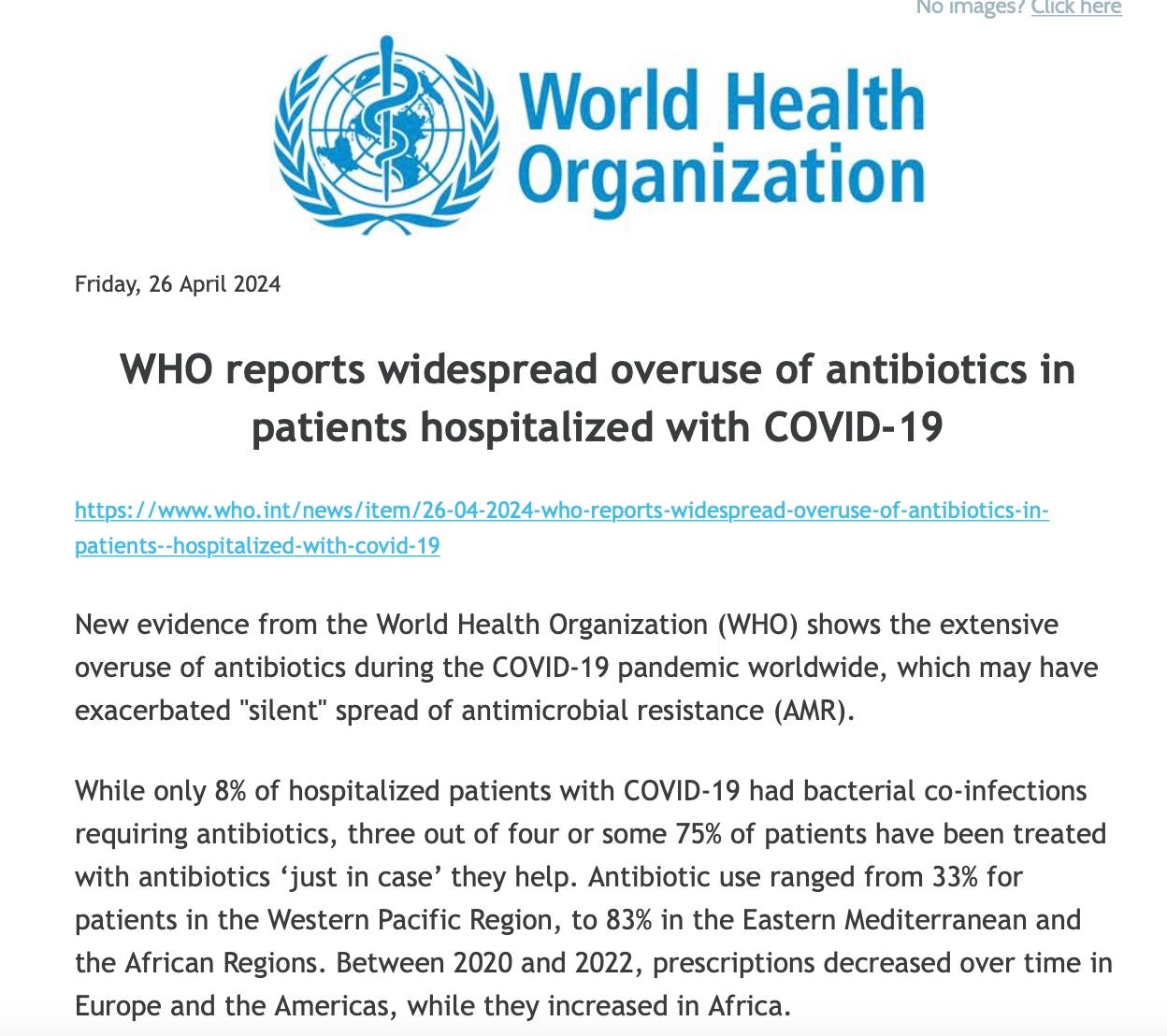The WHO creates so many false narratives it is hard to play whack-a-mole
Guess we need to exit the WHO or encourage nations to stop paying for it and let it whither away or become the avowed plaything of industry, without the charitable cover story
There are several agendas that the following story feeds.
The first purpose of this story is to enhance a narrative that will lead to restrictions on the use of antibiotics in future.
The second narrative is about One Hellth. The only justification that makes any sense at all in the One Hellth narrative is the fact that antibiotic resistance can develop in humans as a result of antibiotics being fed to livestock and poultry. Note that the WHO never emphasizes the fact that most antibiotic resistance would probably disappear if antibiotics were no longer included in animal feed. They are included because they increase growth rates.
By maintaining antibibiotics in animal feed, antibiotic resistance continues to develop in bacteria in the gut of livestock, and those that grow in/on the meat during processing, packaging and storage.
Then the WHO, FDA, EMA etc. can use this as the justification to impose restrictions on antibiotic use for humans (who only consume about 20% by weight of antibiotics used in the US—the rest are for animals) and to justify the need for “One Hellth.”
The thing is, doctors are supposed to take care of the patient in front of them, and their role is not to shortchange that patient, who might benefit from antibiotics, because they are now being charged with “protecting the planet” from antibiotic resistance. When the regulators restrict the use of antibiotic in animal feed, we will know they are serious about AMR and perhaps then other means to control it will make sense. But not before then!
… Highest rate of antibiotic use was seen among patients with severe or critical COVID-19, with a global average of 81%. In mild or moderate cases, there was a considerable variation across regions, with the highest use in the African Region (79%).
WHO classifies antibiotics as per AWaRe (Access, Watch, Reserve) classification, according to the risk of AMR. Concerningly, the study found that ‘Watch’ antibiotics with higher resistance potential were most frequently prescribed globally.
“When a patient requires antibiotics, the benefits often outweigh the risks associated with side effects or antibiotic resistance. However, when they are unnecessary, they offer no benefit while posing risks, and their use contributes to the emergence and spread of antimicrobial resistance,” said Dr Silvia Bertagnolio, WHO Unit Head for Surveillance, Evidence and Laboratory Strengthening, Division for AMR.
“These data call for improvements in the rational use of antibiotics to minimize unnecessary negative consequences for patients and populations.”
Overall, antibiotic use did not improve clinical outcomes for patients with COVID-19. But rather, it might create harm for people without bacterial infection, compared to those not receiving antibiotics. This underscores the urgent need to improve the rational use of antibiotics to minimize unnecessary negative consequences for both patients and populations.
A systematic evidence synthesis and appraisal will complement this work to inform upcoming WHO recommendations on antibiotic use in patients with COVID-19, as part of the guidelines for the clinical management of COVID-19.
These findings are based on data from the WHO Global Clinical Platform for COVID-19, a repository of standardized individual-level, anonymized clinical data from patients hospitalized with COVID-19. Data was collected from some 450 000 patients admitted to hospitals for COVID-19 in 65 countries over a 3-year period between January 2020 and March 2023. The findings are being presented in a WHO scientific poster shared at the ESCMID Global Congress, taking place in Barcelona, Spain on 27-30 April.
“These findings underscore the important need to adequately resource the efforts to improve antibiotic prescribing globally, and are particularly relevant to discuss ahead of the upcoming UN General Assembly High-Level Meeting on AMR to take place this September,” said Dr Yukiko Nakatani, WHO Assistant Director-General for AMR.
The UN High-Level meeting on AMR will bring together global leaders to commit to mitigating AMR across human health, animal health, agri-food sectors and the environment, and to promote political leadership, financing and actions to slow the emergence and spread of AMR.





It is a private entity and has no business telling anybody what to do, for any reason.
Dr. Nass keeps identifying heath care scams on top of healthcare scams. Somebody who is coming up with all these programs is a diabolical genius.
I still say we have to nuke all of these Alphabet Health Agencies ... "just to be sure."